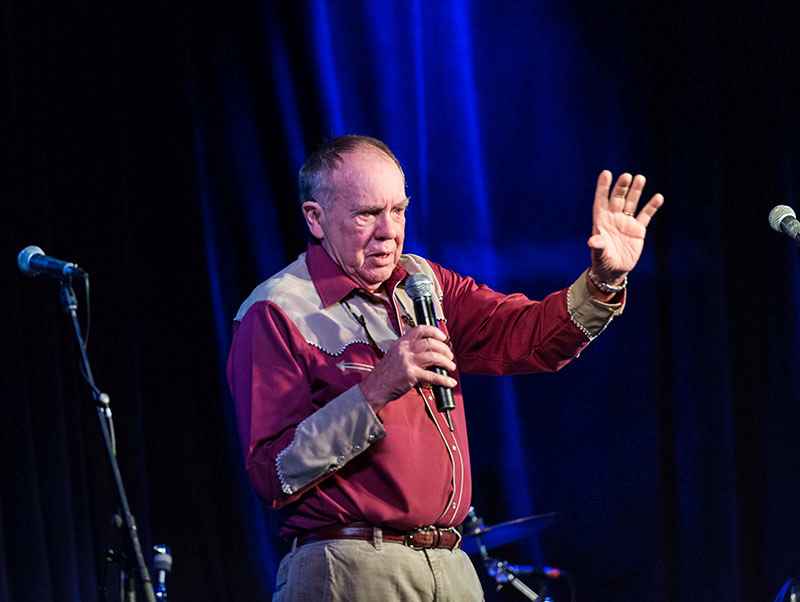Lomax on Lomax: Folk Music History at Kerville Festival
By PHIL HOUSEAL, Contributing Writer
When music fans attend “Lomax on Lomax” at the Kerrville Folk Festival on June 7, they will learn the secrets of a 500-year-old musical mystery–the real story of Froggy Went A Courtin’.
That is more propitious than it might sound. Because presenter John Lomax III is carrying on the musical legacy of the Lomax family that started with his grandfather writing down the lyrics of songs he heard passing cowboys sing on cattle drives in 1875.

“It was in 1875 or ‘76 when the family moved from Mississippi to Meridian, Texas, and the Chisholm Trail ran practically through their back yard,” John Lomax III recalled. “He would hear the cowboys sing and started writing down the words way back then, when he was probably 8 or 9 years old. He not only remembered all these words, but he worked out a way to remember the melodies. These wound up in his first book 35 years later in 1910.”
The Lomax family continued to chronicle the early folk music, stories, sermons, and even children’s games from the American frontier. Grandpa John’s children Bess, John II, and Alan picked up the passion. Alan Lomax, John III’s uncle, was credited with discovering, recording, and launching several blues legends including Leadbelly, who he discovered singing in prison. Lomax figures that nine members of his family have published 50 books covering this musical legacy.

Lomax intends to tell these stories and more when he presents a program at the 50th Kerrville Folk Festival on Wed, June 7 at Quiet Valley Ranch on Highway 16, nine miles south of Kerrville, Texas.
The now 76-year-old descendant has led an illustrious career of his own in the music business. He has been active in the Nashville music scene since 1971, helping manage and publicize the careers of such talents as Townes Van Zandt, Guy and Susannah Clarke, and David Alan Coe.
“I was just trying to be in the music business and Nashville was far better for me than New York or LA,” he said. “So I wrote steadily about the music and what was happening in Nashville and all that sort of thing.”
Stepping away from writing his international columns in 2017, Lomax moved into public speaking about the Lomax legacy. It’s a new venture in several ways.
“Until I started, no one was really doing it,” he said of his area of study. “Last year a friend asked me to do a house concert, so I worked this up and went out and did it. It got a good reception, so I kept doing it. I presented last October at Rice University, so I am in my seventh or eighth month of being a performer in my own right, after 52 years supporting artists as a manager, journalist, publicist, or roadie.”
Fittingly, this performance will happen at the Kerrville Folk Festival, exactly 50 years after his father performed at the first ever event held back in 1972.
He plans a multi-media show that follows the journey of the Lomaxes through five generations.
“I’ll be starting with my grandfather and the cowboy songs and frontier ballads,” he said. “I’ll do some singing, including Home On The Range, which he was the first to publish in a book. I plan to have visuals, sing a couple of songs a cappella, like my father, uncle, and brother did. I don’t consider myself an accomplished singer, but I’m just going to get up there and let it rip.”
He is looking forward to this new venture as much as folk music fans should be.
“It is hugely emotional to sing at the same event my father sang at during the very first one in 1972,” he said. “Plus the event takes place not far from where my grandfather started out, collecting songs first in Texas and then later in all 50 states.”
He considers these songs as so interesting, especially “in contrast to the monolithic radio product out there now.”
“You’re not going to hear these songs anywhere else,” he said.
The process of collecting American folk songs has changed since the days his 10-year-old granddaddy scribbled down words he heard outside his window.
With the advent of smart phones, there is no need to carry around 20 pounds of recording equipment in back of car, or recording on wax cylinders on a hand-cranked phonograph tied to a saddle horn.
Yet there is still a need for the research. And the love, the desire, the quest for chronicling continues in the Lomax blood.
“For me, it’s all about reintroducing some of the great songs of our history,” said Lomax. “There would be no way for people to hear these if not for me singing them or finding rare recordings. That’s what this show is–me walking people through 150 years of Lomaxes, discovering, promoting, presenting, and protecting this great American music that might have been lost if my grandfather hadn’t started doing this.”
As an example, he brought up the oldest song he plans to sing.
“It’s Froggy Went A Courtin’,” he said. “That song is 500 years old and traces back to Scotland. Most people know a verse or two, but as an American ballad and folk song, it has 35 verses. For the show, I cut it down to 18 verses. It’s a song that defies description.”
After this show, fans will listen to even familiar songs in a different way. He admits to making up verses on the fly.
“Hey,” he said, “it’s folk music.”
When asked why people should attend his presentation, he turns serious.
“I’ll just say that these are parts of our shared cultural heritage that you may not know about. I think you’ll enjoy hearing these wonderful songs that describe the events and lives of the common people, which grandfather at one point was told he should not be collecting. Of course he didn’t listen to that bunch of malarkey. He felt like the expressions made by the American people mattered. You know, they collected a lot more than just songs, but also stories, party games, church services, and all sorts of things for the Library of Congress.”
This is a chance for people to hear things they wouldn’t hear otherwise, and to learn a little bit about one family who has doggedly been involved and doing this now, through five generations and 150 years.
“If it weren’t for those recordings, would Muddy Waters have ever been discovered?” Lomax said. “Our work is not just about money. There’s a whole long list of artists that the family has helped along the way, without any financial reward–just the reward of knowing that they’re helping to save parts of our culture that might otherwise have been lost forever.”
———————————————————————————————————-
John Lomax III will present “Lomax on Lomax” on Wed, June 7, at 7:30 p.m. at Threadgill Theater at the Kerrville Folk Festival, located at Quiet Valley Ranch 9 miles south of Kerrville on Highway 16. The event concludes its 18-day run on Sunday, June 11. Information on tickets, parking, performers, and locations can be found online at www.kerrvillefolkfestival.org.

Phil, thanks so much for shining a light on my show and the family’s century and a half contributions to unique American musicians and their music. Sure hope to bring the LOL Show to San Antonio – after all, that’s where John Avery Lomax found “Home on the Range” – from a Negro saloonkeeper near where the Menger Hotel stands today. Best regards, John Lomax III
I grew up near the Lomax family in Houston and John II used to sing us old folk songs like “Steamboat Bill” in his booming voice as he drove John III’s little brother Joey and me in our school carpool. At the first Kerrville Folk Festival in downtown Kerrville when John II performed, his rustic and almost primitive renditions, including shouts, shocked some of the festival goers, who were expecting more sedate folk music a la Peter, Paul and Mary. John II was an amazing original and personified the legacy his brother Alan documented so thoroughly. It’s great to know that John III is continuing the important Lomax family legacy. ML
Thank you, Arts Alive San Antonio, for your very good introduction to this year’s Kerrville Folk Festival. Please consider a similar report on its conclusion. some of us no longer able to attend in person depend on such things. Here’s a piece I wrote for Anne who has been playing and singing these songs for more than 50 years. We appreciate what you do, Milton Jordan
Crowded Memory
Songs roll across your mind like a ball
tracks along the rim of a roulette wheel
that never ceases whirling. The stoic
croupier might wait to rake his table,
but we strain forward gambling on your bright
words’ reward when the wheel of your mind
slows and your lyrics spin out around us.
Once, we all remember, your voice rang sounds
that silenced the busy clatter filling
the room where we gathered for Friday
supper and singing to end most weeks.
Our yesterday songs now fallen away,
but your “Starlight on the Rails” glistens
and we still sing along with “Truckers’ Cafe.”